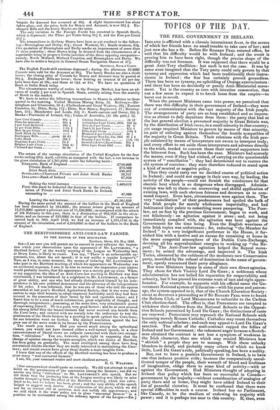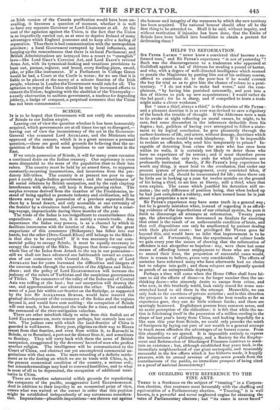TOPICS OF THE DAY.
THE PEEL GOVERNMENT IN IRELAND.
IRELAND is afflicted with a chronic intermittent fever, in the access of' which her friends have no small trouble to take care of her ; and just now she has a tit. Before Sir Roam PEEL entered office, he said that his difficulty would be with Ireland ; and the event is proving him to have been right, though the precise shape of the difficulty was not foreseen. It was supposed that there would be a great Anti-Tory ebullition : but such is not the case. It was by some even imagined that the Tory party could only govern by that tyranny and oppression which had been traditionally their instru- ments in Ireland : the fear has certainly proved groundless. There has been no tyranny, no upholding of Orange exterminators : and there has been no decidedly or purely Anti-Ministerial move- ment. Yet is the country so torn with intestine commotion, that not a few seem to expect it to break loose from the empire—to burst out in revolt.
When the present Ministers came into power, we perceived that there was this difficulty in their government of Ireland—they were out of communication with the vast majority of the Irish people. The arrangements of party are so long established and so impera- tive as almost to defy departure from them : the party that had at the last general election a presumed majority in Great Britain was, by the distribution of Irish races, in a small minority in that country; yet usage required Ministers to govern by means of that minority, on pain of enlisting against themselves the hostile sympathies of the majority in Great Britain. Their relations with the Irish peo- ple subsisted by means of interpreters not sworn to interpret truly; and every effort to set aside those interpreters and advance directly to the truth, tended to convert those their natural supporters into the bitterest foes. Such has been the case. Ministers had scarcely the means, even if they had wished, of carrying on the questionable system of " conciliation " : they had determined not to restore the old system of coercion : they were therefore reduced to stand upon a kind of neutral or negative policy.
Thus they could carry out no decided course of political action in Ireland ; and could not engage in their own way, by leading, the activity of the people—could not furnish the conductors for that electric heat which is so dangerous when disengaged. Adminis- tration was left to them—an unswerving and skilful application of existing laws, with such obvious fairness and decorum as to com- mand respect. Even here, circumstances were against them. The very " conciliation" of their predecessors had spoiled the bulk of the Irish people for merely wholesome impartiality, and had habituated their palate to something more pampering. The Poor- law, set on foot by the previous Government, began to work, and not felicitously : an agitation against it arose ; and, not being immediately complied with, the agitation was bent against the Government for the time being. Even the English weariness of trite Irish topics was unfortunate ; for, reducing "the Member for Ireland " to a very insignificant performer in the House, it fur- nished him with a motive and an excuse for remaining at home in the more congenial atmosphere of the Dublin Corn-Exchange, devoting all his superabundant energies to working up "the Re- peal." The Anti-Poor-law agitation helped the Repeal move- ment; he seized the advantage, and improved it. The Irish Tories, alienated by the coldness of the moderate new Conservative party, mortified by the refusal of domination in the name of govern- ment, openly renounced their party allegiance. Nor were Ministers happy in some of their own direct agencies. They chose for their Viceroy Lord DE GREY; a nobleman whose administration has not belied his reputation for respectability and urbanity, but it has proved his extreme want of tact and right appre- hension. For example, he supports with his official name the Go- vernment National system of Education—with his purse and patron- age, the system opposed to it, that of the Church Education Society : about as decorous a proceeding as if Sir ROBERT PEEL were to haunt the Reform Club, or Lord MELBOURNE to subscribe to the Carlton Club election-fund. The effect is, that Protestants are tempted to withdraw their children from the National Schools to the Opposi- tion Schools patronized by Lord DE GREY ; the distinctions of caste are renewed : Protestants may reproach the National Schools with becoming merely Roman Catholic ; Catholics may vaunt themselves the only national scholars ; and each may appeal to Lord DE GREY'S sanction. The affair of the mail-contract capped the follies of Ireland and her Government : the vehement anger because a Scotch- man obtained the contract is not less a symptom of weakness in the Irish character, than one which may remind Ministers how " skittish " a people they are to manage. With these unlucky blunders in detail, and probably many others of which we know little, Lord DE GREY'S rule, politically speaking, has been a nullity. But, not to have a positive Government in Ireland, is to have one that induces positive evils; because the comparatively uncul- tivated temper of the people, their warmth of blood and liveliness of imagination, oblige them to some kind of activity—with or against the Government. Had Ministers thought of adopting in Ireland that policy which has been so successful in Canada— government by the majority—without consideration of analogies of party there and at home, they might have added Ireland to their list of peaceful victories. It must be confessed that there were special difficulties in such a course. Ireland has no Parliament, like Canada, to be the medium of endowing its majority with power; and it is perhaps too near to this country. If, then, even an Irish version of the Canada pacification would have been un- availing, it becomes a question of moment, whether it is well to have any separate Governor or Lord-Lieutenant at all. At the root of the agitation against the Union, is the fact that the Union is so imperfectly carried out, as at once to deprive Ireland of many advantages which England possesses and to keep alive a feeling of separation. Thus there is bad communication with the metropolitan province; a local Government corrupted by local influences, and keeping up the remembrance that there is no local Parliament; and British Administrations are betrayed into a resort to "unenglish" laws—like Lord GREY'S Coercion Act, and Lord Etiox's revived Arms Act, with its tyrannical-looking and vexatious provisions to hunt out, pursue, register, and brand, every fowling-piece, sword, pike, or pike-like instrument. If a Parliament in College Green would be bad, a Court at the Castle is worse ; for we see that it is liable to be placed at the mercy of a minute fraction of the Irish people, whereas in London the Government would rule for all. The agitation to repeal the Union should be met by increased efforts to cement the Union; beginning with the abolition of the Viceroyalty— a costly obstruction to uniform government, a nucleus for degrading jobbery, a badge of conquest, a perpetual memento that the Union has not been consummated.



























 Previous page
Previous page